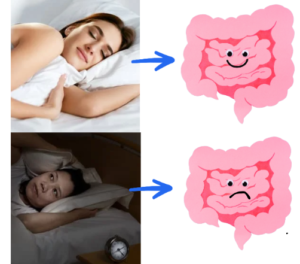Exploring the Crucial Link Between Quality Sleep and Optimal Digestive Health
Sleep is not merely a period of rest; it is an essential biological function that significantly influences our digestive health. The complex interplay between sleep and digestion involves numerous physiological mechanisms that work harmoniously to support the body. The circadian rhythm, often described as the internal body clock, coordinates both sleep patterns and digestive processes. This synchronisation is evident as individuals commonly feel hunger at regular intervals throughout the day, showcasing the body's remarkable ability to operate in tandem with its natural biological cycles, thereby ensuring efficient digestion and nutrient absorption.
How Quality Sleep is Essential for Enhancing Digestive Health 
Sleep is vital for the body’s healing, rejuvenation, and restoration of various systems. The deeper stages of sleep are especially important for these restorative functions. During these critical phases, the organs, tissues, and cells that constitute the digestive system not only relax but also actively engage in essential repair processes. The body emphasises cellular repair and growth during deep sleep, focusing particularly on regenerating the cells that line the digestive tract. These cells undergo constant wear and tear due to exposure to food particles and digestive enzymes, so their regeneration is crucial for maintaining the integrity of the gastrointestinal lining, which significantly enhances the effectiveness of digestion.
Deep sleep plays a crucial role in bolstering the immune system, which is especially vital for the digestive system, as it houses specialised immune cells activated by the beneficial bacteria that inhabit the gut. These immune cells are essential for protecting the gut and the entire digestive system from harmful pathogens, thereby ensuring a balanced population of bacteria within the gut ecosystem, which is critical for optimal digestive function.
Furthermore, the organs within the digestive system play a key role in detoxification, enabling the elimination of waste and harmful substances from the body. Deep sleep enhances this detoxification process by optimising the functioning of the liver and kidneys, allowing these organs to operate at peak efficiency. The interconnectedness of sleep and detoxification is a significant factor in promoting comprehensive digestive health and overall wellness.
Examining How Sleep Patterns Influence Gut Motility
An essential component of digestion is the effective movement of food and waste through the digestive tract, a process known as gut motility. This process experiences significant changes during sleep. Throughout both deep and light sleep, the rate of gut motility is notably reduced. This reduction is a necessary adjustment, allowing the digestive system to conserve energy, which can then be redirected towards repairing digestive tissues. By conserving energy in this manner, the digestive process is optimally prepared to function more effectively during waking hours, thus enhancing both nutrient absorption and waste elimination.
The migrating motor complex refers to a series of contractions that occur during fasting periods, including during sleep. This cycle is critical for gut motility, as it effectively removes food particles and residue that may remain in the digestive system. This natural cleansing mechanism of the digestive tract reduces the risks of bacterial overgrowth, thereby promoting a healthy gut environment. Notably, the migrating motor complex is most active during the night when individuals are fasting and asleep, highlighting the essential role of sleep in maintaining the health of the digestive system.
As dawn approaches, gut motility gradually increases, preparing the digestive system to efficiently process and digest food. This rise in motility can also trigger the first bowel movement of the day, demonstrating the finely tuned interplay between sleep and gut motility. Understanding this connection is crucial for optimising digestive health and enhancing overall well-being.
Investigating Hormonal Influences on Sleep and Digestive Health
Ghrelin, often referred to as the hunger hormone, plays a pivotal role in stimulating appetite, while leptin communicates to the brain that the stomach is full, helping to prevent overeating. These hormones are fundamentally important for appetite regulation; however, their functions can be adversely affected by a lack of sufficient sleep.
Even a single night of insufficient sleep can lead to elevated levels of ghrelin, which may increase appetite and trigger cravings for carbohydrates. This phenomenon is often described as feeling ‘hangry’. Compounding this issue, leptin levels can drop after a night of inadequate sleep, disrupting signals that indicate fullness. This creates a challenging scenario where individuals may find themselves overeating and struggling to recognise their body’s signals to stop eating. While occasional poor sleep may not have major consequences, chronic insomnia can lead to significant digestive challenges, including gut inflammation, liver disorders, gastroesophageal reflux disease, inflammatory bowel disease, and even colorectal cancer, alongside promoting weight gain.
The Impact of Sleep Disruption on Digestive Health
Disruptions to sleep can result in a variety of digestive issues. Factors such as shift work, especially night shifts, and experiencing jet lag can significantly disturb sleep patterns, thus throwing off the body’s internal clock. Additionally, eating late at night or maintaining irregular meal times can adversely affect the quality of sleep. The circadian rhythm that regulates sleep is intrinsically linked to natural sunlight, which plays an important role in sustaining a healthy sleep-wake cycle.
Unfortunately, in today's technology-driven world, many individuals find themselves spending the majority of their daytime indoors, leading to reduced exposure to natural light. This change has resulted in increased exposure to blue light emitted by devices such as laptops, televisions, and smartphones, further disrupting the sleep cycle and sleep patterns, especially when this exposure occurs shortly before bedtime.
The cumulative effects of these factors can lead to serious digestive issues, including diarrhoea, ulcers, inflammatory bowel disease, or disturbances in the delicate balance between beneficial and harmful bacteria in the gut. This imbalance can also compromise the integrity of the gut lining, exacerbating difficulties related to digestive health.
Improving Microbiome Health Through Quality Sleep Practices
The microbiome consists of trillions of microorganisms dwelling in the gut, primarily made up of beneficial bacteria known as probiotics, in addition to viruses, fungi, and potentially harmful bacteria. These microorganisms are crucial for not only overall health but also for digestive health. They enhance the immune response and assist in digestion, facilitating the production of essential vitamins, enzymes, hormones, and amino acids. Recent research has uncovered a strong connection between the microbiome and sleep, showing that disrupted sleep or chronic insomnia can unfavourably alter the balance of these microbes, ultimately impacting digestive health and general well-being.
Understanding the Interconnections Between Microbiome Health and Sleep Quality
The relationship between sleep and microbiome health is intricate and multifaceted. Poor sleep can adversely affect microbiome health, while an unbalanced microbiome can also negatively influence sleep quality. To better understand this complex association, one study indicated a link between a higher abundance of specific bacterial types in the gut and faster sleep onset, as well as fewer awakenings during the night. Although this article cannot encompass all findings, the key takeaway is that fostering a diverse and thriving population of beneficial bacteria in the gut is essential for achieving optimal sleep, effective digestion, and overall health maintenance.
Examining the Links Between Stress, Sleep, and Digestive Well-being
A prevalent consequence of stress and anxiety is disrupted sleep. Conversely, these mental health challenges can also negatively impact the physical health and functionality of the digestive system. Such disruptions can lead to altered gut motility and contribute to complications such as indigestion, ulcers, and irritable bowel syndrome. A crucial element in this dynamic is the influence of the so-called stress hormone, cortisol.
Understanding How Cortisol Impacts Digestive Processes
When cortisol levels surge, the body enters a fight-or-flight mode. This physiological response diverts blood flow to critical areas such as the heart, brain, lungs, and muscles while reducing circulation to the digestive system. This reaction prepares the individual to either confront danger or flee, a response that was vital for survival in prehistoric environments.
In contemporary situations, however, stressors are often less life-threatening, such as financial burdens, work-related pressure, or inadequate sleep. While the short-term redirection of blood flow may be beneficial in acute scenarios, chronic stress can adversely affect the digestive system, particularly regarding gut motility. This can manifest in symptoms such as constipation, diarrhoea, indigestion, gas, and bloating. Consequently, implementing effective stress management strategies is crucial for supporting both gut health and achieving quality sleep.
Ensuring adequate sleep is paramount for maintaining a healthy digestive system, as the connection between sleep and digestion is inherently intertwined. Prioritising effective sleep hygiene practices is essential for achieving restorative sleep. This encompasses minimising exposure to blue light from electronic devices, adhering to a consistent sleep schedule, creating a cool, dark sleeping environment, avoiding food intake within two hours preceding bedtime, and ensuring exposure to natural light during the day, particularly in the morning.
References
Understanding Digestive Health and Circadian Rhythms
Exploring Sleep Dysfunction and Digestive Conditions
Examining the Link Between the Gut Microbiome and Sleep
Investigating Stress and Its Effects on the Digestive System
The Article: How Sleep Affects Your Digestive System appeared first on https://janestevensnutrition.com
The Article: Sleep’s Impact on Your Digestive System Explained appeared first on https://janestevens.net
The Article Sleep’s Impact on Digestive Health Explained Was Found On https://limitsofstrategy.com
The Article Sleep’s Impact on Digestive Health Uncovered found first on https://electroquench.com


This post really resonates with me, especially the point about the circadian rhythm acting as our body’s internal clock. It’s fascinating how our biology is so intricately tied to both sleep and digestion. I’ve noticed myself how much my eating habits shift depending on how well I sleep. For instance, after a rough night, I often crave sugary snacks, which I suspect is my body’s way of searching for quick energy.